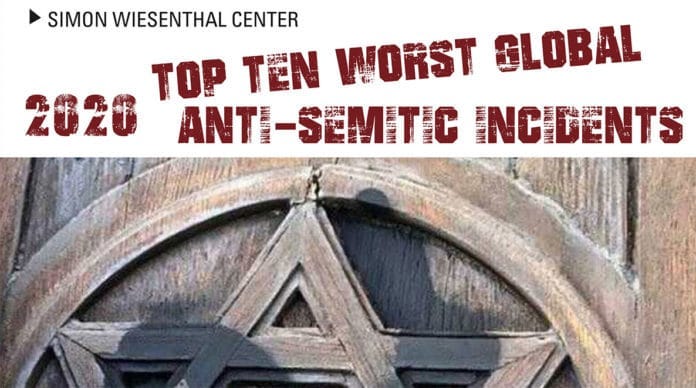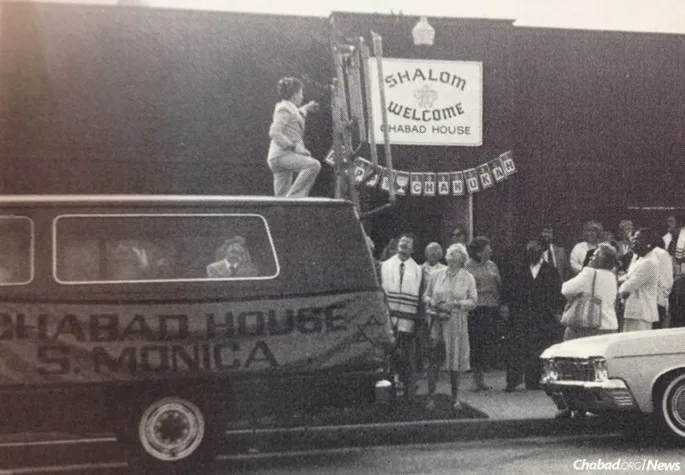“A lie can be halfway around the world before the truth has its boots on.” - Proverb
Last year, Chabad Rabbi Dov Wagner hosted twelve fraternity brothers around a menorah for Hanukkah at Sigma Chi, one of USC’s least Jewish houses. Two days later, the Rabbi’s wife Runya was lugging 32 dozen donuts into the Chabad house when she was approached by a young man who offered to help. She accepted and they began talking.
“He says, ‘Ma’am, you were at Sigma Chi the other night, weren't you?’” Rabbi Wagner recounts. “She says, ‘Yeah.’ He says, ‘Well, I was there. I'm in Sigma Chi. I was in the next room. I didn't come to the event because it had nothing to do with me, but I was on the phone with my mom. I told her there's a Hanukkah thing going on in the next room. She says, 'do you know that I'm Jewish?' A week and a half later, he comes to Shabbos dinner with a friend. It was the last Shabbos of the semester so we went around and shared favorite memories. He says, ‘My favorite memory is right now! This is the first Shabbat of my life. I just discovered I'm Jewish.’ Then he comes over to me. He says, ‘My mom is so excited I'm here. She wants me to take a selfie with the Rabbi!’ I said, ‘Sorry, I can't tonight. You know? Another time.’”
In terms of numbers, Jewish life at USC is peaking. Rabbi Wagner and Runya arrived as USC’s first shluchim in 2001, when there was only a Hillel house with five or six members. Since then, Chabad has grown exponentially. Weekly Shabbat dinners began at five attendees, now they average 300. A big annual Shabbat event used to draw 250-300 students, this year it broke the record with 1,450 in attendance. Hanukkah was once limited to candles and prayers at the Chabad house—now there’s 29 separate events drawing hundreds of students at locations across campus, including Sigma Chi.
https://instagram.com/p/Cbi31u3PAMt
The Victim Narrative
If you read the internet, you might think these numbers are moving in the opposite direction. USC has been characterized as a hotbed of antisemitism. The Simon Wiesenthal Center mentioned
USC in their list of top 10 antisemites in 2020, and the LA Times characterized
it as a “Toxic atmosphere of hatred.” These narratives stem from social media posts against outspoken Zionists on campus, the backlash against those posts, and the backlash against the backlash, all occurring online.
Some Jewish students say they are afraid.
“My social media pages were filled with people sharing their opinions with really hateful and slanderous words against Jews,” says Melanie Kijel, a sophomore at USC. “I remember seeing some of my closest friends posting and contributing to that toxic environment…I felt personally attacked and frankly scared.”
But Rabbi Wagner says that USC’s Jews have never been prouder, stronger, and readier to show off their Judaism in public. Other students agree.
“I have never felt threatened to state my ties to my Jewish heritage,” says grad student Sam Lichtman. “In fact, being Jewish has become more of a conversation starter because there are so many Jews spread across all of campus. Even many non-Jews ask for invites to Chabad to learn about Jewish community.”
Suppressive toxicity online. Communal freedom in real life. It’s a microcosm of a dichotomy faced by all Americans, and particularly American Jews, as we’re increasingly pushed into subgroups by the powers that be:
Which is it? Are we victims? Or are we peaking?

Soul Food
To help answer, I asked Rabbi Wagner and Runya to unpack the reasons for the growth of Jewish life at USC, and to help me understand why, despite the numbers, the countervailing victim narrative remains so persistent.
They give roughly five reasons for Chabad’s growth at USC—the younger generation’s emphasis on purpose over profits, the preciousness of genuine IRL community, the decreased accessibility of other campus events due to COVID, their own natural improvement as shluchim over 20+ years, and, put simply, free food. While the details are complex, the broad strokes are clearer: young people are craving meaningful face-to-face experiences.
“We noticed, about a week or two into the semester, something fascinating,” says Rabbi Wagner. “You stood on campus before COVID and called out to somebody walking past. Invariably, they had earphones, earbuds, something in their ears, lost in their own world, looking at their phone, and maybe they were paying attention and heard you, maybe they didn't. Now it has started changing. People are stopping and talking away from their phones.”
Rabbi Wagner doesn’t believe that people are flocking to Chabad because of a spiritual void in modern life, or that his followers are seeking refuge from hedonism. He views those rationalizations as needlessly negative. Rather, Chabad’s magnetism derives from the nature of the soul, and how it navigates the many distractions of contemporary life.
“The nature of the world is that it hides its source. It hides the Godliness,” says Rabbi Wagner. “Sure, back in the day, that might have been a lot more black and white—just the pork sandwich was the exciting thing, right? Nowadays there's all kinds of color and excitement. We have that part of us that's more than happy to engage in whatever the narcissism of the day is, whatever the enjoyments of the day are, but ultimately, there's also that part of us that remembers what it wants and what it needs. I think if we're awake to that, that automatically pulls us back in the direction of searching. Your soul has an innate natural need, just as your body craves nutrients. Even if you don't realize it, it needs its nutrition.”
Students agree with the Rabbi on this point.
“Our society is driven by a consumeristic, mass consumption lifestyle where one needs to always be working towards obtaining something tangible and moving up in status,” says Melanie Kijel. “So many people nowadays believe that we don’t need religion because we can’t tangibly see how it makes us more effective and efficient.”
In sum, despite what we’ve read online, USC’s in-person Jewish community is thriving and there isn’t just one answer as to why. But, Judaism is speaking to the souls of college students in a stronger way than perhaps any other time in American history. Online, USC is a hotbed of antisemitism. IRL it’s anything but.
The Stolen Menorah
Per Chabad tradition, shluchim affix giant menorahs to the tops of their cars and deliver prayer materials to Jews during Hanukkah. Rabbi Wagner and Runya are no different, except this year something strange happened—they woke up one morning and the giant menorahs were gone; smashed off the tops of their cars and stolen. The following morning, the menorahs reappeared, delivered back to the Chabad house without a trace of who had taken them.

Then came an important decision. “We're all familiar with it because, especially as rabbis, we see it every Hanukkah. Around the world, somewhere, there's a menorah that's vandalized. The story is going to be picked up everywhere. Meanwhile, I had been posting about the numbers we were reaching, 1,450 students showing up in the middle of everything, choosing to engage proudly and meaningfully in their Judaism. If we’d focused on the smashed menorahs, it's the exact opposite of what Hanukkah at USC was.”
He faced pressure from Jewish organizations to share news of the crime before the case was solved. They believed it was another symbolic act of antisemitism. But the Rabbi hesitated.
“If it turned out these were hateful people who did this as an antisemitic act, I'd be the first to demand that the book be thrown at them,” says Rabbi Wagner. “There's no room for that in society at all. But if that wasn't their intent, do we really want their lives to be destroyed?”
The truth was shortly revealed. A prank by a pair of drunk students. They woke up mortified to see giant menorahs lying on the floor of their dorm room. They returned the menorahs and ultimately turned themselves in. Rabbi Wagner impressed upon them that even if it was not a hateful act, it would be taken as such, and they should be careful not to have their lives ruined by a stupid mistake.
He resisted the pressure to make international headlines.
The Housewife and the Mouse
So why are headlines about anti-semitism so irresistible?
“I think it's because simplicity sells,” says Rabbi Wagner. “There's an institution that's easy to attack and it's going to get a lot of clicks because it's a prominent university. That story is exciting. Jews choosing to engage proudly and meaningfully in their Judaism? Nobody's interested in that story. Nobody picks that up.”
While narratives of fear may be tempting to indulge, they’re not the whole story. Making them so risks reducing Judaism to something that it isn’t.
“Sometimes it's easier to have an identity by what you're not. Some peoples' Jewish identity is made up of, well, they hate us, but we're not vexed, right? We're going to stand up to that, or we're going to hide from it. Fight or flight,” says Rabbi Wagner. “It’s more meaningful when you have an identity about who you are, what you are. It’s the difference between freedom from and freedom to. If all you want is freedom from something, then now you're free, now what? Now what are you going to do with it?”
Runya adds: “I think when you show people you're afraid, then it lends itself to being more afraid.”
As the Rabbi explained, we can choose to see spiritual craving in a positive way or a negative one. Are USC students flooding into Chabad seeking shelter from a dark world? Or are they drawn to the light despite many diversions? Jews faces the same decision. Is Judaism a reaction against hate? Or is it an opportunity to produce good… so long as we don’t get distracted?
“I remember hearing the story about a rabbi that was approached about attending some protests. He asked, ‘are the protestors like the housewife or like the cat?’ Both the housewife and the cat don't want mice in the house, but the housewife doesn't want there to be mice at all. The cat wants there to be mice so he can get rid of them.”
“Be the housewife,” says Runya.
“Woops. That was dated, that story. Different era,” says the Rabbi. “The house owner. Maybe instead of housewife, say house owner!”
